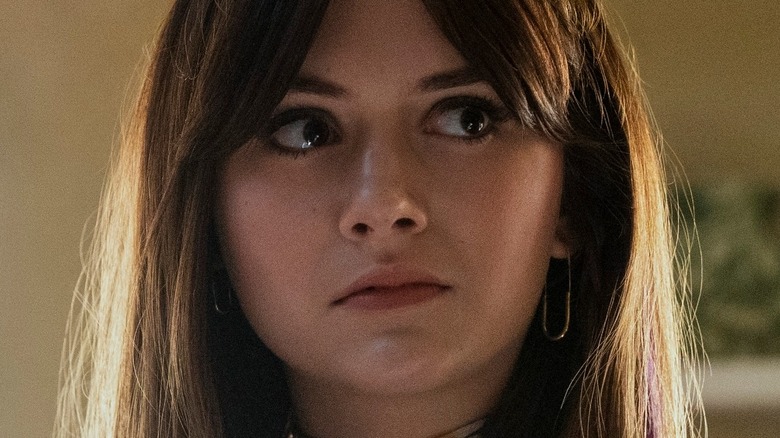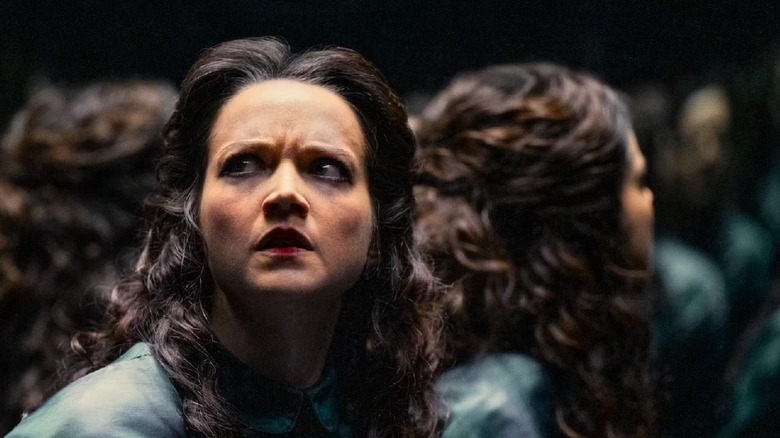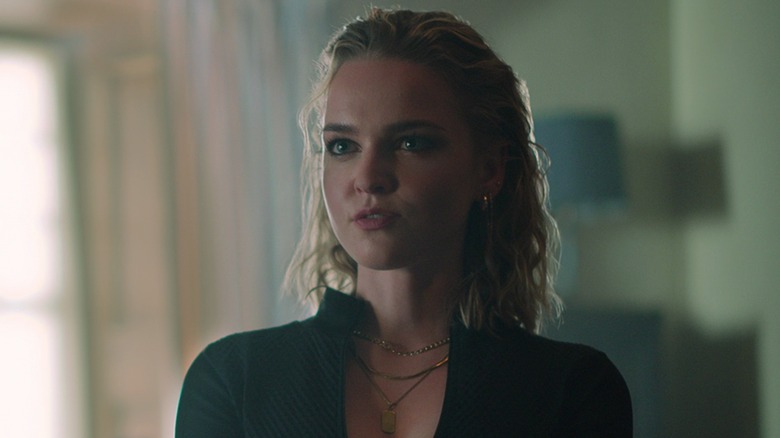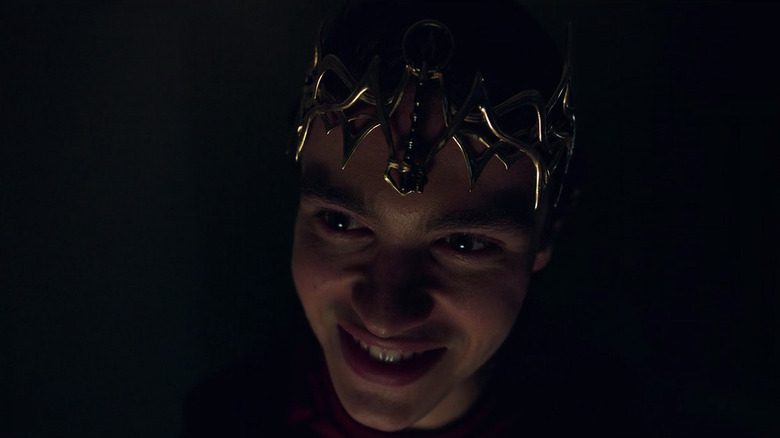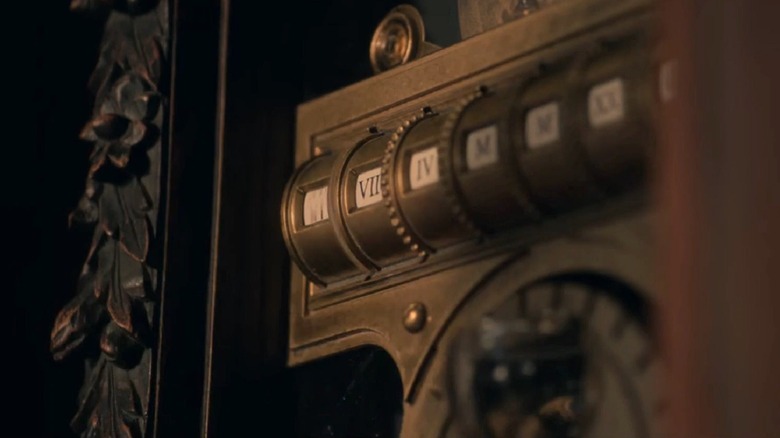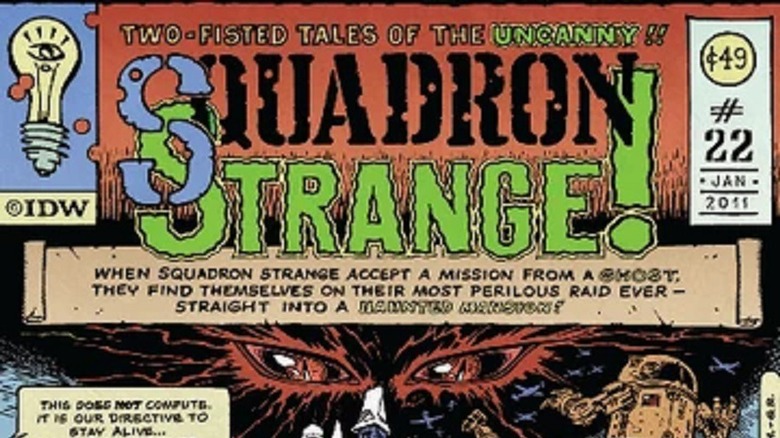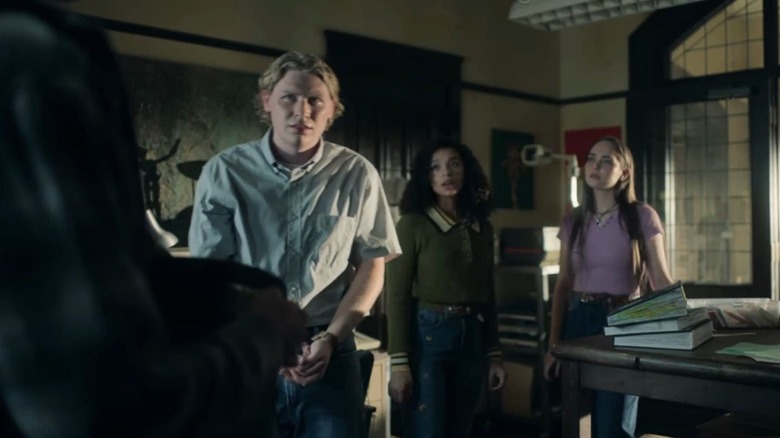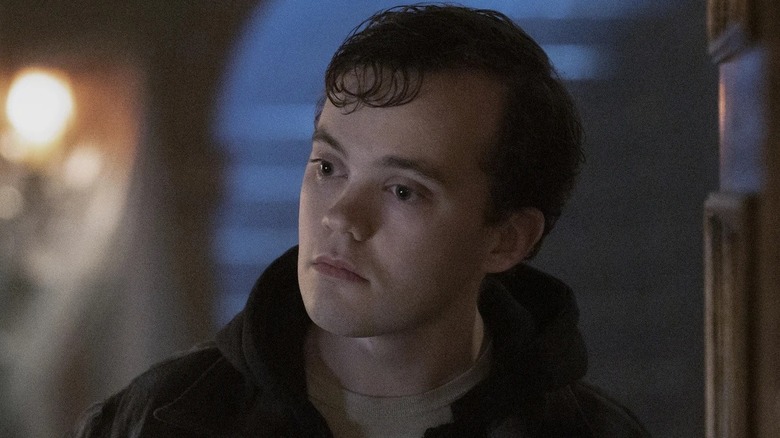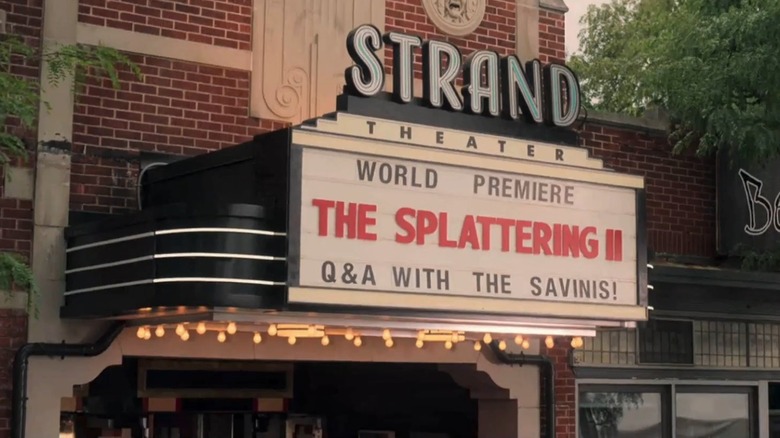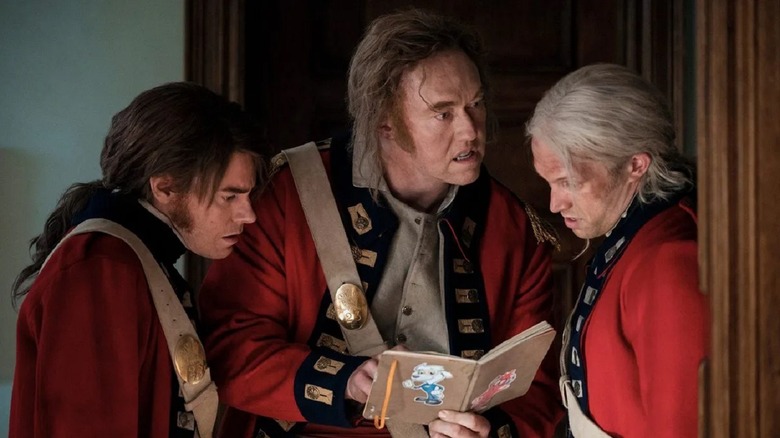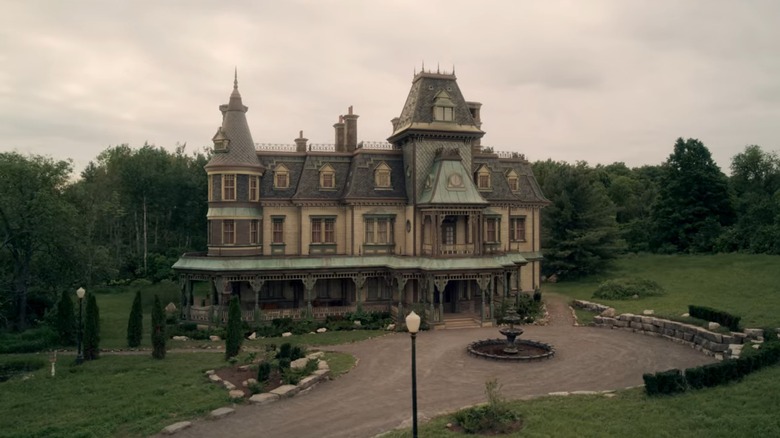Biggest Unanswered Questions In Locke & Key Season 3
The Locke family faces a tough new challenge in their third and final season on Netflix. "Locke & Key" is a story about magic and adventure in a world full of evil. While the series is based on the hit comic from Joe Hill and Gabriel Rodriguez, the show has taken its own exciting path while still incorporating most of the characters and larger elements from the source material. What the folks behind the show have crafted has secured a dedicated group of fans who will be sad to see the series conclude, but the showrunners say a three-season run has been the plan for quite a while. But did the ending of "Locke & Key" Season 3 live up to the previous two installments?
Usually when a season of a serialized TV show season ends, viewers are speculating what could happen next and asking what plot threads have yet to be tied off. This time around, there is no coming back and there are no questions to ask about future episodes or what's to come, but that doesn't mean that everything has been addressed. The showrunners could have purposefully left a few things on the table to let minds wonder about, and eight episodes might not have been enough to finish off everything the way the showrunners wanted. There could even be some small nagging questions they didn't think anyone would need an answer to that still flummox diehard fans. Whatever the case, those are the things we're here to look at — everything that's left unanswered when the credits roll on "Locke & Key" Season 3.
If it's not obvious, this article contains spoilers for "Locke & Key" Season 3.
What happened to Dorothy and Ada Wheeler?
The two evil sisters open up the show trapped inside of a snow globe and employ a clever tactic — using the few resources available to them — to eventually be noticed. It seems like Dorothy and Ada Wheeler have been stuck there for quite some time. Luckily for them, Bode finds the corresponding key in the fridge and the family is once again playing with magic they don't quite understand; therefore, these cloaked evildoers are released back upon the world and make things a nightmare for the Locke family by trapping the youngest in their former prison.
We don't learn much about the sisters in the time they have on screen, but Nina and Kinsey surmise that they are demons. We're shown that the pair is incredibly familiar with the keys, and their clothes hint that the bodies they possess are from a different age. Knowing that their enemies are supernaturally strong, the available Lockes arm themselves for battle. With some ingenuity on the part of Nina — who, at this point, is an old hand when it comes to this sort of thing — the two are dispatched to a pocket mirror dimension, seemingly stuck for the rest of time.
The twisted duo come up again in the second episode, but other than that brief threat they pose, the Wheeler sisters seem to be single-use baddies. One might think they would also need to be pushed back through the portal to make sure it stays closed for good, but maybe the mirror dimension does the trick just as well.
Did Eden's family receive any closure?
At the start of Season 3, the main characters aren't aware of Eden's fate, as Kinsey Locke comments that they haven't heard from her. At first, Bode Locke even believes that Eden might be the one terrorizing them, but his sister is quick to point out that Eden was never the camping type. The show reminds us of her end when we see the two demon sisters retrieve a key from the drama queen's twisted corpse in the first episode. We are also told that Eden's family, who believe their daughter has simply run away, are still looking for her. Initially, Kinsey also assumes Eden is still alive, but it isn't long before she discovers the body down in the depths of the well.
Eden's former classmates do the appropriate thing after dismissing several bad ideas regarding how to deal with the body. Kinsey, inspired by the misfortunes of the original Keepers of the Keys, has them take Eden's body to the cliffs and throw her into the ocean where her body will most likely never be found. The group tries to say nice things about her — for instance, they note that Eden would love knowing she's mostly frozen, and therefore well preserved. After agreeing that she deserves their thanks, they sing her some Jimmy Eat World in tribute. But did anyone think to call Eden's parents? Because that would certainly be the responsible thing to do.
What happened to Lucas Caravaggio?
Lucas' story is a tragic one, even relative to a world as devastating as that of "Locke & Key." Back in the '90s he was a young man with a bright future until his companions decided to open the Black Door, which led to his demonic possession. At that point he killed two of his friends before a third one managed to put him down. Later, he's brought back as an echo, but the demon Dodge remains in the driver's seat. Poor Lucas has no control over his actions as the spirit that controls his body wages a war against the Locke family and his remaining comrades. At the end of Season 2, however, Dodge is destroyed and Lucas is finally set free, but he's a man out of his time.
In Episode 1 of the third season, Nina asks Ellie Whedon — Lucas' former girlfriend — if she's spoken to him. But what does a man who has been stuck in limbo for over two decades do when he's suddenly released? He goes on a journey to find himself, of course. "He needed to get out of here, start fresh someplace else," is Ellie's answer, which explains why he isn't around for this final adventure. However, we still don't know what he does with the rest of his life, assuming he survives the portal's permanent closure. Lucas is an echo — someone who died and was brought back with the keys — and perhaps one of the only people who remembers what truly happened in Matheson.
Who made the Timeshift Key?
One of the big new keys this season comes with its own full-sized mysterious clock, but no instruction manual. The Timeshift Key allows the user to go back in time and see the past, but the travelers can't change anything. In theory, the fact that the key won't let users influence the past directly should prevent its operators from messing up history. In practice, the key is unpredictable.
The question of who built the Timeshift Key probably can't be answered, as the only clue we are given is that Bode tells Benjamin Locke about it. According to the established rules, Benjamin shouldn't even remember that interaction; so perhaps that encounter is what put the seed of inspiration in his mind to build the Timeshift Key. If the creation of the key itself is based on a paradox, that might explain why Bode doesn't find it earlier in the series. The other answer, of course, is that it was crafted by a different relative we never see on the show, but that conclusion isn't as much fun.
Was Squadron Strange ever published?
Rufus Whedon has a military mind and an overactive imagination, both of which he uses to create his own comic book called "Squadron Strange" when he isn't helping the Locke family. What the group of imaginary elite soldiers go through seems to be based on the people Rufus knows and the weird and magical occurrences in Matheson. It makes sense, as a comic book could work as a way for the young man to process everything going on and the trauma of dealing with someone like Dodge and the horrible things that happen to his mother. "Squadron Strange" is clearly important to him and Ellie, as we see a piece of it framed and placed on the mantel in their new home.
Several people are aware of Rufus' work. Not only has Bode shown interest in "Squadron Strange," but Jamie Bennett also mentions wanting to read the stories at Duncan's wedding. In the season's final episode, we see Rufus applying some finishing touches as his mom asks questions about the ending. This scene shows how much the book meant to him and how it ties in with his desire to remain in Matheson. Is the next step to get "Squadron Strange" published? It does tell a version of their adventures, and it may give insight into Rufus' future, even if most readers won't comprehend the context of the story's inspiration,
Why wouldn't they let Gordie Shaw into the group?
Gordie just wants to be a part of the group, on center stage with everyone else, but that never happens for him. Even now, all these years later, we see him telling Ellie how much he covets the closeness that her friends had, but he could never know what they bonded over. Ellie mentions they just had their own thing, but Gordie isn't allowed to know about magic, despite his close proximity to it. He witnesses the so-called Keepers flagrantly abuse the keys and use them to keep their secrets for themselves, and they never consider allowing him in on the fun. He's important enough to invite to Duncan's wedding and use as a hiding spot for a magical item, but not important enough to keep his memories.
While the series shows us an exploration of the inside his head, we see a concise cut of Gordie's life and what is important to him. There is a great scene where Rendell says that Gordie deserves the lead spot in a production of "The Tempest," to the point that the young Locke offers to drop out. This is where Gordie shines, telling Rendell not to drop out, because that isn't the way he wants to get the part, and how important the role of an understudy is. Gordie is full of aspirations, still searching for his big part to play while remaining quite selfless. In death, Gordie proves himself and shows Ellie that perhaps he was worthy of being with them and could have been more than just a background character.
What was Sam's death like?
Sam Lesser is a complicated character — he starts as a menacing villain and becomes an angel of redemption. His arc comes to a close this season when he finally takes some real action to help the family he wronged by possessing the body of an echo named James Bolton. When the real Bolton is tricked into leaving his body behind and pushed through the Ghost Door, Sam makes his move and helps the Lockes. This leaves Bolton's ghost indefinitely roaming the grounds of Keyhouse. In Bolton's body, Sam could have simply left and lived a new life, but he decided to help the Lockes retrieve the last key, knowing they could never completely forgive him for killing Rendell.
Inside the mind of Gordie, we are shown a beautiful representation of what the final moments of a dying mind look like; however, Sam is pinned under a piano in a fight and tells the others to leave before it's too late. But what happens when a ghost in a stolen body dies in someone else's mind? We do see a bright light, a smile, and a glimpse of Sam one last time, but it's hard to say exactly what's happening with so much magic clashing. At least Sam most likely didn't feel much pain, and he still gets a credit in "The Splattering II."
Will there ever be a Splattering III?
The first film was a major hit and an indie darling, so of course there's a sequel. But will "The Splattering" ever make its way to becoming a full trilogy? The special effects only look as good as they do because of keys, and now that those are gone, is there hope for one final installment living up to the hype?
In Episode 4, Doug says, perhaps jokingly, that former director Scot Cavendish was holding the rest of "The Splattering" filmmakers back, and maybe that's true. "The Splattering II" receives another great ovation and mounds of praise, even from Scot, so perhaps he can return for one more. Those films are something special to these characters, however. Scot said it best — the movies are the closest thing to proof of the real magic they performed and how great that time of their life was. It'll be weird years later after they forgot about the keys and watch both Splatterings, wondering how they could have pulled all that stuff off. Maybe if Scot becomes a famous director, he can get a big enough budget for some special effects to kind of match the keys, but there's no way it'll be the same. No matter what else the characters do in front of or behind the camera, they'll have that perfect set of indie films on their IMDb pages.
Why was Frederick Gideon so special?
Many fans were surprised by the apparent defeat of Dodge, the show's central antagonist, in the final episode of "Locke & Key" Season 2. This was especially surprising to those familiar with the source material, as there is no other main villain present in the comics, but the Netflix series introduces the colonial soldier Captain Frederick Gideon as an even larger threat. He is quite ruthless and comes close to achieving the goal of unleashing his home realm upon Matheson, but the twisted Brit is quite different from Dodge and feels like he's missing something. Although he has ties with the Locke family ancestors and his own descendant Josh Bennett, it's his demon side that makes him special and an interesting antagonist.
We never learn the demon's true name, but all others can sense him and seem immediately aware of how powerful he is. The only demon who understands this but still doesn't respect him or his intentions is Dodge. Gideon is cunning, and he has the supernatural strength to back it up, even going so far as to tear down the Wellhouse. He is also the only demon who looks to have a direct connection with the portal when he possesses the keys, making it appear that his true power resides deep within him. Whether this comes from being one of the older spirits from the other side, the fact that he absorbs others like him, or he's at the top of some type of demonic hierarchy, there isn't much to go on.
Is the magic gone from Keyhouse for good?
Keyhouse is a mysterious and magical place. Some of that same potential lies within the blood of the Locke family, but the real power comes from beyond the portal. The escaped demons were forged into keys, but their presence in this world caused more harm than good. This final season seeks to wrap things up, and nothing says finality more than throwing the keys, along with all the other associated items, back into the ethereal realm they came from. Bode doesn't want to do it, because giving up magic is understandably difficult, but it seems like the only way to ensure that the nightmare scenarios the family have been facing for the past few years are truly over.
In the end, Bode even comments about not hearing the keys anymore, but we can pick up a few soft whispers. The sound is low enough for some viewers to miss it, but that hint — even if it is an unnecessary tease — is exciting. Even though the show is finished, it's hard not to wonder if the door has been left open for more adventures, either for a slightly older Bode or the next generation of Locke children. It wouldn't even need to be a return of the keys, as the house itself and members of the bloodline are quite special on their own. It's a solid ending that leaves enough room for interpretation, showing just how magical the world of "Locke & Key" is to its fans.
